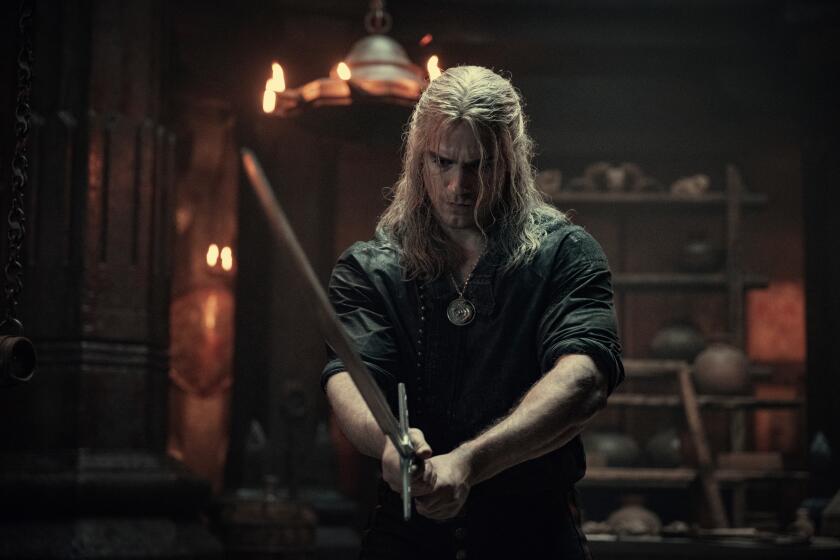TELEVISION REVIEW
“Work doesn’t become art until some rich person comes along and buys it,” Alfred Stieglitz tells his about-to-become-famous wife in “Georgia O’Keeffe,” which premieres tonight on Lifetime. And one has to wonder if the corollary might be “and an artistic career isn’t all it could be until someone does a biopic.”
Certainly O’Keeffe could not have asked for a more pedigreed tribute. “Georgia O’Keeffe” stars Joan Allen and Jeremy Irons and is directed by Bob Balaban from a screenplay written by Michael Cristofer. Not surprisingly, considering the number of Tony, Oscar and various awards and nominations the film’s cast and creators bring to it, it is intelligent, gorgeous and very, very good.
Focusing on the passionately complicated love affair and marriage between the artist (Allen) and her mentor-husband (Irons), “Georgia O’Keeffe” may be dealing with a modern sensibility -- the two were openly lovers long before Stieglitz left his wife and married O’Keeffe in 1924 -- but it is an old-fashioned film, as formal in its pacing as the two were in their relationship; up until Stieglitz’s death in 1946, the two referred to each other as “Mr. Stieglitz” and “Miss O’Keeffe.”
At the heart of it is, of course O’Keeffe, a woman of stunning straightforwardness and little extraneous baggage. Neither afraid of nor impressed by New York society, she nonetheless succumbs to Stieglitz’s seductions all in one swoop, makes no apology for either their adulterous love or her decidedly non-feminine dedication to her art.
Not that Stieglitz sees her art as unfeminine. When O’Keeffe expresses a desire for children, her husband refuses, arguing that she was put in this world “not to breed but to paint, paint, paint.”
He, meanwhile, was put in this world to promote those paintings. When O’Keeffe discovers he has mounted a show filled with his unflinching and detailed photos of her nude body, he meets her furious reaction with TMZ-like pragmatism -- there is no such thing as bad publicity.
“Emma Goldman can preach free love and feminine power until she’s blue in the face,” he says, “but you embody it,” pointing out that his exhibit purposefully preceded hers, setting the stage for her emergence as “the female Picasso.”
He’s right, of course, and it’s difficult to imagine O’Keeffe becoming the artist she was without him. But a marriage born of mentoring can be a dangerous thing. As O’Keeffe’s fame grows, so does Stieglitz’s insecurity, which soon soothes itself through an affair with a wealthy young art patron. O’Keeffe may understand the cause of the infidelity, but it breaks her heart nonetheless. Eventually she flees to the sheltering bosom of Mabel Dodge Stern (played wonderfully and all too briefly by Tyne Daly) at her ranch in Taos, N.M.
There O’Keeffe discovers the imagery and landscape that will make her famous, and the understanding that the image one has of oneself is the only one that matters.
It’s a simplistic message, boiled down like that, and though “Georgia O’Keeffe” is a quiet film it is not a simplistic one. It’s easy to understand Allen’s decision to executive produce “Georgia O’Keeffe;” the years she has spent playing quietly roiling women allow her to evoke the enigmatic and iconic artist without seeming to lift a finger or an eyebrow. As Allen plays her, O’Keeffe’s brilliance is of the no-frills variety, as is her belief in women’s equality. While many among the New York art community preached revolution, O’Keeffe simply lived it. Even taking into account her often co-dependent relationship with Stieglitz, she constructed a life that up until then had been reserved for the male artist. She learns to drive so she can make her way into the desert to paint; she paints because that is her way of communicating with the world. Neither O’Keeffe nor Allen seems drawn to the temptations of artistic scenery chewing.
That is left to Irons, who is having a grand old time as usual. His Stieglitz is picture perfect, down to the bushy mustache, a man perceptive enough to understand the talent of his wife, but incapable of acknowledging the nature of betrayal. He is almost homicidally childish, certain that he and O’Keeffe are an unassailable partnership, even as his infidelity drives her to a nervous breakdown.
And he may have been right after all. Certainly their love is the seam that defines O’Keeffe’s life, if only as a division between before and after. That love and their marriage remain as iconic as her work, or his, flawed and complicated, serving perhaps too many masters to serve any well, but utterly and unapologetically undeniable all the same.
--
--
‘Georgia O’Keeffe’
Where: Lifetime
When: 9 tonight
Rating: TV-14-LS (may be unsuitable for children under the age of 14 with advisories for coarse language and sex)
The complete guide to home viewing
Get Screen Gab for everything about the TV shows and streaming movies everyone’s talking about.
You may occasionally receive promotional content from the Los Angeles Times.




